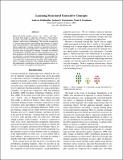Learning Structured Generative Concepts
Author(s)
Stuhlmuller, Andreas; Tenenbaum, Joshua B; Goodman, Noah Daniel
Downloadstructured-generative-concepts-cogsci2010.pdf (310.1Kb)
OPEN_ACCESS_POLICY
Open Access Policy
Creative Commons Attribution-Noncommercial-Share Alike
Terms of use
Metadata
Show full item recordAbstract
Many real world concepts, such as “car”, “house”, and “tree”,
are more than simply a collection of features. These objects
are richly structured, defined in terms of systems of relations,
subparts, and recursive embeddings. We describe an approach
to concept representation and learning that attempts to capture
such structured objects. This approach builds on recent proba-
bilistic approaches, viewing concepts as generative processes,
and on recent rule-based approaches, constructing concepts in-
ductively from a language of thought. Concepts are modeled
as probabilistic programs that describe generative processes;
these programs are described in a compositional language. In
an exploratory concept learning experiment, we investigate hu-
man learning from sets of tree-like objects generated by pro-
cesses that vary in their abstract structure, from simple proto-
types to complex recursions. We compare human categoriza-
tion judgements to predictions of the true generative process as
well as a variety of exemplar-based heuristics.
Date issued
2010Department
Massachusetts Institute of Technology. Department of Brain and Cognitive SciencesJournal
32nd Annual Meeting of the Cognitive Science Society 2010
Publisher
Cognitive Science Society
Citation
Stuhlmuller, Andreas et al. "Learning Structured Generative Concepts." 32nd Annual Meeting of the Cognitive Science Society 2010, August 11-14 2010, Portland, Oregon, USA, Cognitive Science Society, 2010
Version: Author's final manuscript
ISBN
978-1-61738-890-3